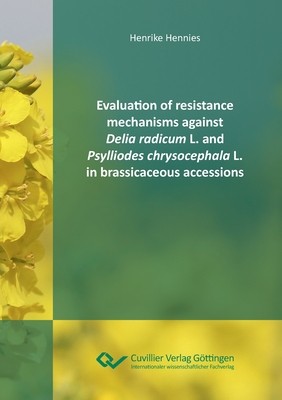
- Išsiųsime per 10–14 d.d.
- Autorius: Henrike Hennies
- Leidėjas: Cuvillier
- ISBN-10: 3736995431
- ISBN-13: 9783736995437
- Formatas: 14.8 x 21 x 0.8 cm, minkšti viršeliai
- Kalba: Anglų
- Extra -15 % nuolaida šiai knygai su kodu: ENG15
Evaluation of resistance mechanisms against Delia radicum L. and Psylliodes chrysocephala L. in brassicaceous accessions + nemokamas atvežimas! | knygos.lt
Atsiliepimai
Aprašymas
control other than the seed coating effective to reduce the plant damage (ERICHSEN 2006). Since the use of neonicotinoids as a seed treatment in oilseed rape was strongly restricted by the EU in 2013 (BAROSO 2013), there is an urgent need to develop alternative control strategies for both D. radicum and P. chrysocephala. Integrated pest management (IPM) may improve the efficiency, profitability and environmental acceptability of oilseed rape production and thereby, contribute to sustainable crop production systems (WILLIAMS 2010). Indeed, IPM "is an ecological approach to managing insect pests, by using different pest control methods, that are aimed at the entire pest complex of a crop ecosystem and finally ensures high quality agricultural production in a suitable, environmentally safe and economically sound manner" (BAJWA & KOGAN 2002). Especially cultivars that are resistant and tolerant to D. radicum and P. chrysocephala attacks may be an alternative to the problematic chemical approaches that promote the development of pest resistance and adversely affect the environment as well as non-target organisms like polyphagous predators and parasitoids (WILLIAMS 2004).EXTRA 15 % nuolaida su kodu: ENG15
Akcija baigiasi už 1d.19:36:28
Nuolaidos kodas galioja perkant nuo 10 €. Nuolaidos nesumuojamos.

- Autorius: Henrike Hennies
- Leidėjas: Cuvillier
- ISBN-10: 3736995431
- ISBN-13: 9783736995437
- Formatas: 14.8 x 21 x 0.8 cm, minkšti viršeliai
- Kalba: Anglų




Atsiliepimai